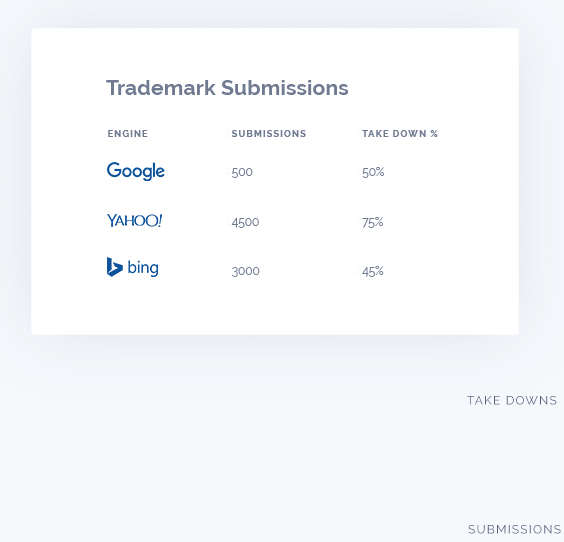Jump to section
Brand protection Lesson #6: Brand bidding enforcement options
Once you detect unwelcome competition, what can you do about it from a legal standpoint?
We won’t bore you with case law here, but you should be aware of a few basic principles and how the law views brand bidding.
- Trademark registration. To maximize your enforcement rights in your brand name and slogans, you must register your trademarks with the USPTO (United States Patent and Trademark Office).
- Brand confusion protection. The main purpose of a trademark is to uniquely identify your product. It serves to prevent another business from promoting a product in a manner that is confusingly similar to your branded product. In order to win a brand bidding case, one of the proofs you must show is that your competitor’s ad is likely to confuse consumers. This single concept is really tough to prove and is why brand enforcement using the law and courts is very, very difficult — more on that in a moment.
- Fair use. This term signifies that your registered marks can be used in special circumstances by advertisers such as resellers, news outlets, reviewers, or product comparisons.
- The law and brand bidding. Numerous lawsuits have been brought by brand owners against the ad sellers (Google and Bing) and the ad buyers (your competitors). The main finding has been that these lawsuits have gone virtually nowhere as a group. Unfortunately, we still don’t know where the law stands completely.
- Trademark owners RARELY win cases against the ad buyers. Why? The burden of proof is too high. Trademark owners have to show that their competitor confused a consumer with their ad. To do that, it appears that the court wants the competitor to blatantly rip off your product description and have a web address and landing page that are similar to yours. Otherwise, they believe that consumers are too smart to be fooled. If no one gets fooled, you lose these lawsuits.
- Trademark owners NEVER win cases against the engines/ad sellers. This painful reality exists because all cases have either been dismissed or settled out of court, so there have been no court judgments. No court has ever said anything bad about brand bidding or clearly endorsed the practice.
Brand Bidding Enforcement Options
To enforce compliance against competitors and affiliates, you have three options: 1) Search engine complaints; 2) pacts or agreements; and 3) lawsuits, explained below.
Search engine complaints
Filing a complaint with Google or Bing is the recommended option because it’s cheap (free to file) and easy, especially if you use an ad monitoring platform to automatically detect and file the complaints on your behalf. Before you get super-excited, however, there are some limitations:
- Protected items: Only registered trademarks are protected.
- Allowed items: Generally, each engine deals with trademark infringement as follows:
- Brand bidding: Allowed. Anyone can bid on your name, as shown earlier in this course when we discussed best practices, managing partners, and reducing competition.
- Ad copy use: Not allowed (with a few exceptions). However, fair use rules allow resellers, affiliates, reviewers, and news outlets to use your name in ad copy.
- Destination URL use: Allowed. Competitors can use your name as a sub-domain or sub-page. In the best practices section, we even suggested that you do this to your competitors. Note that while the engines allow this, it does not mean that the law allows it. The more confusingly similar a URL is to the brand holder’s, the stronger the brand holder’s case becomes from a legal standpoint.

Pacts and agreements
Another method to enforce protection is with agreements. Agreements give you stronger and more reliable legal recourse than just complaining to the engines alone.
- Competitive pacts: Some industries have gotten together, and competitors have formed written pacts where they have specifically agreed not to brand bid. These written agreements list in detail the allowed and prohibited activity, as well as enforcement proceedings should they be violated, which typically come with a financial price tag.
- Affiliate agreements: If you have affiliates or partners, your affiliate agreement should detail the allowed and disallowed brand bidding activity, along with notice rules and financial ramifications for any violations. The swiftness and harshness of your action should match the conduct, which includes:
- Direct linkers. This harmful advertising practice is when affiliate marketers assume the identity of the represented merchant in paid ads. It should be dealt with swiftly, since someone is hijacking your brand outright. Actions should include financial withholding and termination of the relationship.
- Unauthorized affiliates. Affiliates who brand bid without authorization are mucking up your strategies. Actions should include notice with cure periods, financial ramifications, and eventual termination if the behavior is repetitive and material.
- Authorized affiliates. Super-affiliates (as discussed in the reducing brand bidding competition topic) should be handled more gently, with kinder notices that build upon themselves and provide cure periods. Financial repercussions and termination should only be used as last resorts.
- Reseller agreements: If you are a manufacturer, you likely have strict rules regarding sensationalized copy, minimum advertised price (MAP) compliance and brand bidding. Your agreements should detail these rules and the ramifications for not following them.
Lawsuits
A lawsuit based on trademark infringement should be your last resort. Trademark lawsuits are expensive and challenging to win (as noted earlier). The caveat is if you have a pact or agreement that prohibits brand bidding, and you have proof of the advertising activity through date/time stamped screen shots, then you have a stronger chance for victory.
The enforcement component to a successful brand bidding strategy is well within the reach of any marketer or agency. Enforcement is attainable with a foundation of always-on ad monitoring, coupled with complaints to the search engines (who do listen!), strong agreements to clarify what’s permissible within your industry and with partners, and (as a last resort) lawsuits.
* * *
We created this course to provide you with all the tips you need to protect your brand and bid effectively on others. It is important to remember that best practices are only beneficial if you have the right tools. The Search Monitor provides global protection for your brand along with competitive insights on paid, organic, and shopping ads. Ready to see it in action?
“The Shawshank Redemption” famously told us to “get busy livin’, or get busy dyin’.” Advertisers have a similar choice. They can stand up and actively protect their valuable branded searches and nurture their potential. Or they can remain complacent and watch their competitors steal their clicks, letting their performance deteriorate. So, what are you waiting for? Schedule a demo today.
Share on Social
See Our Data at Work
Provide us with a competitor’s website, a set of keywords, or one of our 1,000+ verticals, and we’ll show you the power of our monitoring capabilities. Request a personalized demo today and see what our insights can do for you!
Trusted by







 Brand Protection
Brand Protection SEM Insights
SEM Insights Affiliate Compliance
Affiliate Compliance Ad Armor
Ad Armor Learning Center
Learning Center Guides & Webinars
Guides & Webinars We Love Data™
We Love Data™ About Us
About Us Our Data
Our Data Careers
Careers Our Team
Our Team News
News Contact Us
Contact Us
